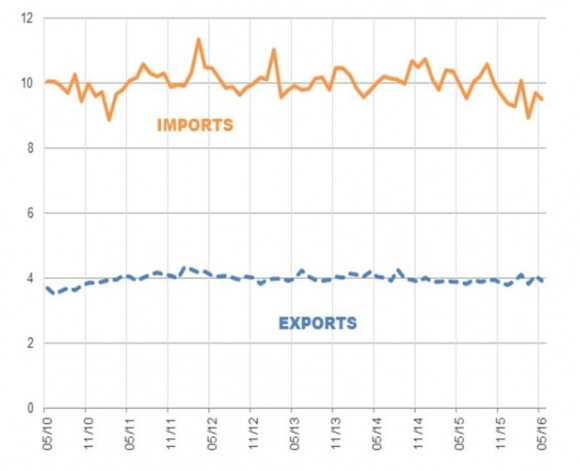I am writing to you from the Virgin Atlantic First Class lounge at London’s Heathrow Airport.
I am awaiting my flight back to San Francisco after spending two months based in Dubrovnik, Croatia and Zermatt, Switzerland.
The good news here is that there is no longer a line to get a foot massage. The bad new is that they are no longer free, costing £35 for 30 minutes of destressing leisure.
Call it another perfect example of supply/demand elasticity. Nobody wants them when they are expensive.
I wish I could have walked down the main street of Dubrovnik with Donald Trump, who has been campaigning for president on an anti-globalization platform.
Having been a vociferous supporter of globalization since it’s dawn, first during a decade spent as a reporter for The Economist magazine, and then as an investor, I could have explained how our international trading system works, and especially why it works for us.
There was a polyglot of travelers from all over the world.
Large groups of Chinese were led by flag bearing guides. Italian Millennials mobbed the bars at night. English couples strolled the majestic limestone fortress walls soaking up the sunshine.
There was even the occasional American student backpacker repeating my own adventure from the 1960s.
And you know what? This disparate international group shared many things in common.
Most of them spent much of the day glued to iPhones or Androids run by US designed apps. Many were staying in accommodations organized by Airbnb (there were over 200 listings for the immediate Dubrovnik area).
They may have made the trip from the airport in an Uber cab. They wore Levis Strauss blue jeans. American pop music pulsed through their ear buds. Probably half of them arrived on a Boeing jet financed by the US Export Import Bank.
In short, they were all sending enormous amounts of money to US companies and shareholders in more ways than they could possible count, without even realizing it.
You never used to see tourists from most countries, like Russia, Spain, Portugal, Italy, or Ireland.
They were too poor.
Rapidly rising standards of living created by globalization changed all of that, creating an enormous new market for American products, especially technology ones.
My Airbnb neighbors in Dubrovnik included a family from Malaysia and a young couple from South Korea.
You can see some of this impact in international balance of trade statistics. In 2015, the US ran a trade deficit with the world of $500.3 billion with consumer electronics, oil, clothes, and cars our largest imports.
Subtract our $262.2 billion surplus in services, which includes financial services, education, patents, and other intellectual property, and that brings our current account deficit down by more than half to only $238.1 billion.
But that doesn’t tell the whole story.
Trade data completely miss the enormous number of products and services that are now given away FOR FREE in exchange for the chance of earning some uncertain revenue at some future date.
Give up your name and email address, and you can obtain almost any kind of online service for nothing. And as far as I know, no government agency has any measurement of this parameter whatsoever.
Needless to say, the United States is far and away the leader in this immeasurable field.
By the way, this might also be the reason why the published productivity data has been so poor, despite the fact that US GDP has grown by 20% since 2009. Everywhere I look productivity is skyrocketing, including my own.
It also might be the reason why Amazon continuously sports a nosebleed valuation. Much of what they provide is FREE and therefore immeasurable.
Of course, globalization wrought havoc on your life if you went into it with the wrong job in the wrong industry and an inadequate skill set.
Blue collar workers tied to textiles, shoes, toys, and other low value added manufacturing were toast, as their jobs fled offshore.
If you didn’t retrain, or adapt you became an angry, mostly white man.
As my friend, New York Times columnist Tom Friedman, likes to say, “Average doesn’t cut it anymore.”
However, while the jobs are gone, the bulk of the profits stayed here in the US. American companies offshored the $2 an hour jobs (mass assembly), but kept the $100 an hour ones (design and marketing) at home.
As my friends in the Chinese government never fail to point out, if they build the iPhone for $100 and we sell it for $700, we are the big winners, not them.
They believe we are perpetuating 19th century colonialism by making wage slaves of their workers.
They may be right.
Globalization enables the US dollar to continue as the world’s reserve currency, as almost all international trade is conducted in the buck.
That is one of the greatest free lunches of all time. It enables the US government to indirectly control the global economy through its own monetary policy. Some half of all US government debt is owned by foreigners.
When sanctions forced Iran to drop out of the international trading system, what did they get? A Great Depression that cut their GDP by 25%. You can’t run a country of 80 million with oil barter deals, gold, and bitcoins alone.
There is also the huge defense benefits that globalization brings us.
Back in the early days, the main reason to steer a country into capitalism was to prevent it from going communist and therefore becoming an enemy.
Grow your allies and reduce your enemies and your defense costs shrink dramatically, raising our standard of living.
That is what has happened.
Increased trade also boosted foreign standards of living, therefore creating a growing market for American goods and services.
This was the whole point of the World Trade Organization, NAFTA, and the Trans-Pacific Partnership.
Humans rarely bite the hands that feed them. They are also highly unlikely to set fire to their paychecks or bomb their sources of income.
Make a foreigner a millionaire, and you turn him into a pacifist. I have seen this unfold time and time again over the past half century, be it in China, Russia, Vietnam, Cambodia, and most recently in Iran.
Create an embedded base of businessmen in any country who are getting rich off of you, and international relations invariably improve.
Any system based on greed is guaranteed to succeed.
A side benefit of all of this is that stock markets go up forever.
Since globalization started in earnest in 1951, the Dow Average has risen from $239 to $18,392, a prodigious gain of some 77-fold.
And you wondered why?
Globalization is the mechanism through which America is paid the dividend for all of the good deeds it has done and inventions it has created for the past century.
I am thinking about the construction of the Panama Canal, Lend Lease and the Marshall Plan, as well as the transistor, memory chip, microprocessor, personal computer, Windows, the Internet, online commerce, the iPhone, and social media.
That is why globalization is a win-win-win for everyone.
There are really only two true communist countries left in the world, Cuba and North Korea, which never joined the international trading community. They also happen to have the planet’s lowest standards of living.
And Cuba will become totally capitalist within two years. Just give them a million iPhones, get them talking, and see what happens. Castro will become just another neighborhood in South San Francisco.
So why end a trading system from which America and its people have profited so mightily?
That is a very good question, one that someone might ask Donald Trump.
To read more about America’s massive services surplus in education, please click here.
To read more about my take on Tom Friedman’s 50,000-foot view of the trends in the global economy, please click here.





